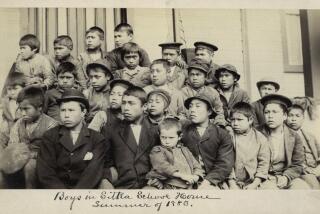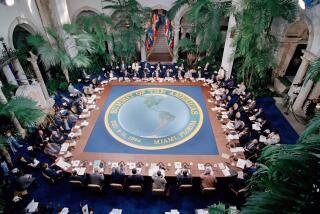Bury This Relic
- Share via
The U.S. Army opened the School of the Americas in Panama in 1946, just as the Cold War was beginning to cast a shadow over Eastern Europe. With Moscow’s forces consolidating the Soviet bloc, Washington sought to exercise some control over the armies of Latin America through a program of professionalized training.
The program also aimed to instill democratic values in rising military officers. In many cases, that’s not the way it worked out. Scattered among the school’s patriotic graduates were future dictators, drug dealers and torturers. Until 1991, interrogation-torture techniques were included in the manual.
The time has come to remove this Cold War relic and pass a bill by Rep. John Joseph Moakley (D-Mass.) and more than 100 co-sponsors to direct the secretary of the Army to shut down the school. A similar bill in the Senate lists among its co-sponsors California Democrats Dianne Feinstein and Barbara Boxer.
With its history, the School of the Americas is hardly the vehicle that Washington should use today in an effort to strengthen ties with Latin America. The message embodied by the legislation should encourage Latin governments to bring their armed forces firmly under elected civilian control. That will not be an easy task in a region where military governments were the norm just a decade or two ago.
Supporters of the School of the Americas say it changed its approach after moving from Panama to Ft. Benning, Ga., in 1984, but the legacy stands. Atrocities committed by its alumni keep surfacing. For instance, the State Department Report on Human Rights for 1998 states that a Colombian army major, a graduate of the School of the Americas, is under investigation by the Bogota government for involvement in a July 1997 massacre of at least 30 peasants.
Then there are the familiar names, graduates like Manuel Noriega, the former Panamanian dictator presently jailed in Miami for drug dealing, and the late Maj. Roberto D’Aubuisson, who created the death squads of the 1980s in El Salvador. All told, the old School of the Americas had a roster of more than 600 notorious graduates. Washington should erase this infamous symbol of the Cold War for good. There are other ways for U.S. service programs to help develop responsible Latin militaries.
More to Read
Sign up for Essential California
The most important California stories and recommendations in your inbox every morning.
You may occasionally receive promotional content from the Los Angeles Times.










